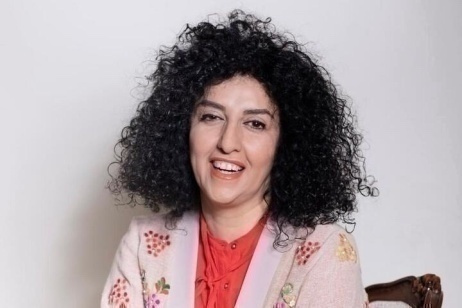By universalizing the idea of Righteousness in the whole territory of the European Union, the EU Parliament sought to stress those values that can provide common ground to all human beings who, though belonging to different nations, confessions and views of life, consider human rights as more important than the aspirations of nations or ideologies. 6 March, the European Day of the Righteous, provides us with the chance to reflect on whom we should remember when thinking back of the dreadful experiences of the XX and XXI century, which though failed to achieve the total annihilation of the human being’s beauty and goodness.
The idea pursued by the Italian GARIWO Committee to create a network of Gardens of the Righteous worldwide to honour all those figures who have defended dignity and rescued other people’s lives during totalitarian regimes or mass exterminations (like in Armenia, Cambodia, and Rwanda) found its supporters in Poland, as well. At the House of Meetings with History in Warsaw, the energy of the Italian promoters was met with the eagerness of people who are persuaded of the immense value of remembering those who have opposed injustice during the rule of totalitarian regimes which violently crushed the human being.
Someone might be surprised to find out that this idea was originated and spread – until the deliberation of the European Parliament – by a grassroot movement, not an institution, but this is what happened in Italy and in Poland, as well, and surely this is what is going to happen in other countries. The Gardens of the Righteous are set up by those who wish to deal with the Righteous personally, without being obliged to do so by decree, but it is important that the resolve of the grassroot associations gains the support of the institutions and meets the favour of the European Union and the Member States, despite remaining a grassroot initiative.
The Committee for the Garden of the Righteous of Warsaw, which today is taking on the responsibility for the Garden that will be set up in the Wola district, had an official patron from the start. Prime Minister Tadeusz Mazowiecki, during the first European Day of the Righteous on 6 March 2013, acted as a mentor of this initiative, though without limiting its grassroot essence. He chaired the Committee for little longer than 6 months, and after his death in October 2013 he became the symbol of this idea both from an organizational and from an ethical way, i.e. through his words and through what he has born witness to in the most critical moments of the XX century.
In Central Eastern Europe, the universal value of the Garden of the Righteous is particularly meaningful in so-to-say “regional” terms: for 70 years (since 1917) these lands have experienced the outcomes of the rise, height and fall of two totalitarian ideologies. These, by mutually inspiring each other, and even by allying to each other for a couple of years, gave rise to a full developed paradigm of evil adopted as a system, in which human beings not only had to lose every right, but even their own raison d’être. In such a world having injustice at its core, the Righteous’ behaviour was a key indication of the path to follow.
The idea of paying tribute to the “figures of Good” is the natural inspiration of the Garden of the Righteous in Jerusalem, set up according by the express wish of Moshe Bejski to remember all those who have rescued the Jews during the Holocaust. As a matter of facts the Holocaust has become the extreme measure of the evil generated by decades of ideology. Communism, too, at least in the period of the Great Terror, did not depart from the genocidal trend of totalitarianism, but the fierce resolve of the Nazis to annihilate the Jews has led the humanity to the edge of self-destruction, and hence it is easier to define the form of Good when faced with such a gross denial of human nature.
The Jews express a great deal of gratitude to the Righteous among nations, and the Jerusalem Garden is a way to thank the figures of the past, a gesture of gratitude of the human beings of a wounded nation towards those few people of other nations who had lent them a helping hand. This action of Israel has gained more and more visibility over time and has become so deeply-rooted in the collective consciousness that the concept of Righteousness has taken up more of a universal meaning, and today it has become the cornerstone of people’s humanity. The European Parliament, by its decision of May 2012, did not defy the traditional role of Israel in this delicate matter, but instead – by making an express reference to it – it stated a supranational principle that can take up a universal value. This way the new Gardens will set an example for today’s people.
In the Garden of Jerusalem there are the names of all those who have deserved a place in it. In the Garden of Warsaw, like in the first Garden, the one of Milan, we are going to choose some figures. Our mission is not to create a Pantheon, nor to list “all those who are worth it”, but to point to some figures whose behaviour, given the context and the characters of their deeds, sets an example and a reference point for the collective consciousness. The Warsaw Committee, which makes its decision on the people to be honoured in a completely autonomous manner, has decided not to procede to a thorough exam of somebody’s biography in search for some stains, but instead to take into consideration their gestures – or a gesture in particular – to avoid the risk of falling easily into the abyss of a kind of an inquisition trial: as is impossible to find a totally untarnished biography, we would find ourself in a dead spot, while we are not interested in pointing to angels, but human beings.
Futhermore, we don’t want to put anyone before others: “our” Righteous are not better tan other Righteous, there is no race for glory, and after all the Righteous are not important per se, but because they are a mirror in which the evil which they tried to oppose is reflected more blatantly. Not only the evil of Nazism and Communism, but also that of other criminal dictatorships that have ruled the world in an “endless history”, as we see today in post-Soviet Russia.
The Committee for the Garden of the Righteous of Warsaw does not view itself as an Areopagus holding all right to judge. We are a group of people who have taken on the responsibility for fulfilling a task and we wish to do it the best way without thinking this makes us entitled to possess the absolute truth. We discuss and we seek an agreement, but we are also ready to a broader dialogue also as far as the criteria according to which we should choose the Righteous. Yet it is necessary to be all persuaded that in the Garden there must be those whose action aims at the construction of the community and do deserve our tribute for this reason.
The idea of honouring the Righteous has already persuaded many people, circles and institutions (like the Museum of Polish Hisoty and the House for History Meetings that have decided to prepare this publication). The Garden that will be set up thanks to these people and organizations is not only aimed at honouring the six Righteous figures chosen this year, or those in whose honour we will plant the trees in the future. The most important element is to prompt a reflection in this corner of our town that was hit so hard by history: every Righteous remembered here has opposed evil and everyone of them is a hope also face any possible relapse of evil.







